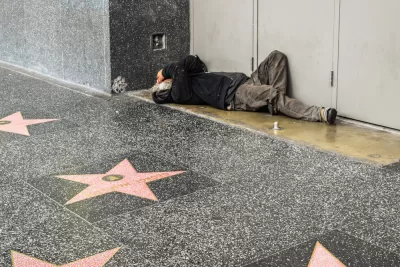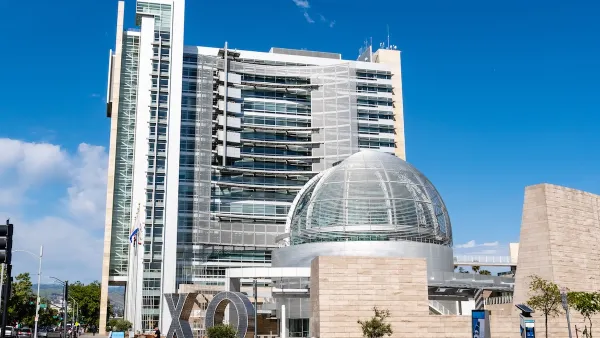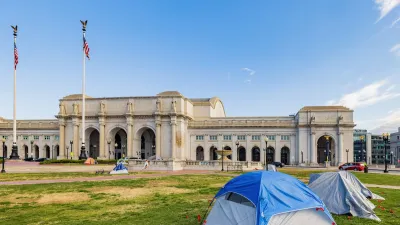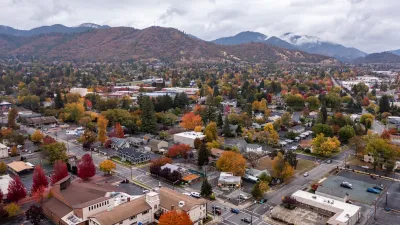The role of business improvement districts in criminalizing homelessness reflects a tension between private interests and public space, Rob Waters writes.

With more Americans becoming homeless every year, the question of how cities should respond to the crisis has grown increasingly urgent. In Next City, Rob Waters unpacks the debate between homeless advocates and business improvement districts over policing and criminalization—a conflict that he says is truly about "the degree of influence that private interests should exercise over the management of public space."
"Today's conflicts between homeless activists and BIDs have their roots in 'slum clearance' efforts of the 1950s and 1960s that razed huge chunks of city neighborhoods and displaced hundreds of thousands of residents, mostly low-income people of color," Waters writes.
BIDs operate in cities around the country, and are designed to allow property owners to collectively pay into area improvements beyond those provided by local government. But on top of street cleaning and marketing campaigns, BIDs have gained a reputation among critics as the "foot soldiers of gentrification" for deploying "private armies" that funnel homeless residents into the legal system. Following instances of harassment, violence, and seizure of property, Waters reports, a study from UC Berkeley suggested that BIDs regularly "exclude homeless people from public spaces in their districts through policy advocacy and policing practices."
Waters delves further into BID activities and speaks to BID representatives about their attempts to attract visitors and raise property values. He also notes a different approach taken by one Community Benefit District in San Francisco: providing tenant-landlord mediation to prevent eviction (a key driver of homelessness) and installing public toilets and needle disposal to improve street cleanliness and public health.
FULL STORY: No Place Left to Go: Business Districts Keep Homeless Populations on the Move

Planetizen Federal Action Tracker
A weekly monitor of how Trump’s orders and actions are impacting planners and planning in America.

Map: Where Senate Republicans Want to Sell Your Public Lands
For public land advocates, the Senate Republicans’ proposal to sell millions of acres of public land in the West is “the biggest fight of their careers.”

Restaurant Patios Were a Pandemic Win — Why Were They so Hard to Keep?
Social distancing requirements and changes in travel patterns prompted cities to pilot new uses for street and sidewalk space. Then it got complicated.

Platform Pilsner: Vancouver Transit Agency Releases... a Beer?
TransLink will receive a portion of every sale of the four-pack.

Toronto Weighs Cheaper Transit, Parking Hikes for Major Events
Special event rates would take effect during large festivals, sports games and concerts to ‘discourage driving, manage congestion and free up space for transit.”

Berlin to Consider Car-Free Zone Larger Than Manhattan
The area bound by the 22-mile Ringbahn would still allow 12 uses of a private automobile per year per person, and several other exemptions.
Urban Design for Planners 1: Software Tools
This six-course series explores essential urban design concepts using open source software and equips planners with the tools they need to participate fully in the urban design process.
Planning for Universal Design
Learn the tools for implementing Universal Design in planning regulations.
Heyer Gruel & Associates PA
JM Goldson LLC
Custer County Colorado
City of Camden Redevelopment Agency
City of Astoria
Transportation Research & Education Center (TREC) at Portland State University
Camden Redevelopment Agency
City of Claremont
Municipality of Princeton (NJ)





























